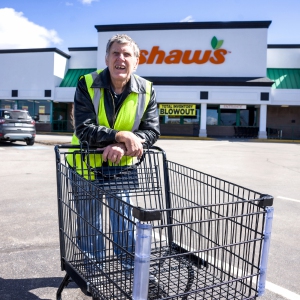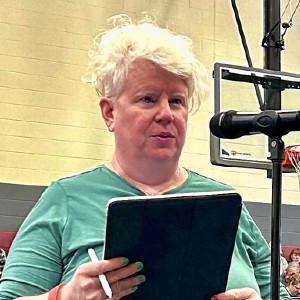A pink procession: survivors and their teams raise over $400,000 to fight breast cancer at annual Making Strides walk
|
Published: 10-27-2024 3:50 PM
Modified: 10-28-2024 10:07 AM |
With a pink, fuzzy boa around her neck and a white sash over her shoulder, Donna Kuethe stood at the entrance to the large tent on Memorial Field smiling, shaking hands, offering hugs.
“Are you a survivor?” she asked each person. “I am, too.”
She reached for the pile of sashes and helped pin them on, then paused to listen to the stories. Kuethe, a 14-year breast cancer survivor, helps run the survivorship tent at Concord’s Making Strides Against Breast Cancer Walk each year.
“I’ve been through a lot in that journey myself, but I’ve also heard so many other stories,” Kuethe said. “Instead of it being about me in 2010, it’s about what I can do for others, and how I can lend an ear.”
Sunday marked Concord’s 32nd Making Strides walk, with around 1,500 people from around the state adorning themselves in pink. This year, 176 teams, alongside the walk’s many sponsors – including Concord Imaging Center, Dartmouth Cancer Center and Catholic Medical Center – raised over $400,000 for the American Cancer Society to fight breast cancer. Prior to 2021, New Hampshire had several more Making Strides events – one in the Lakes Region, one in North Conway and one in Manchester. These events have since merged into two annual walks held in Concord and Exeter.
“When they start walking it’s just a sea of pink, and it reminds you how important this day is and how much it means to people, said Courtenay Needham, the American Cancer Society’s Director of Development in the Northeast.
According to the American Cancer Society, breast cancer is the most common cancer diagnosed among women in the United States and the second leading cause of female death from cancer, behind lung cancer. The organization predicted around 42,000 women and 530 men will die of the disease this year alone.
The crowning moment of the walk, a procession of survivors and thrivers – those with metastatic breast cancer – kicked off the event. For Kuethe, a resident of Gilford, the survivorship tent offers a sense of solidarity ahead of the walk. Knowing how emotional the walk can be, she always offers to stand with new survivors during the procession.
Article continues after...
Yesterday's Most Read Articles
 After four decades collecting carts, Ricky Tewksbury will retire when Shaw’s closes mid-April
After four decades collecting carts, Ricky Tewksbury will retire when Shaw’s closes mid-April
 Written shooting threat sends Concord High students home early
Written shooting threat sends Concord High students home early
 ‘It’s everything’: In largest rally yet, Trump protestors descend on Concord
‘It’s everything’: In largest rally yet, Trump protestors descend on Concord
 DHS email error causes stress, anxiety for New Hampshire's Ukrainian community
DHS email error causes stress, anxiety for New Hampshire's Ukrainian community
 ‘There was no oversight’: NH child advocate has been a watchdog for children's care. Now, the office is on the chopping block
‘There was no oversight’: NH child advocate has been a watchdog for children's care. Now, the office is on the chopping block
“We all have something in common,” she said. “We all come from different walks of life. We come from all different areas of New Hampshire, and we have this one thing in common. Each of us had a different journey to get here. There’s like nobody that has the exact same journey.”
When Kuethe first got involved in the Making Strides walk, she had just learned that chemotherapy treatment had not succeeded in shrinking her tumor.
Although she did not feel well enough to attend the walk herself, a team participated in her honor.
“When I saw 46 people that were my friends and colleagues and people I knew walk out with my team name on the back of their shirts, I cannot tell you what did for me, and I’m sure that for every cancer survivor who has people walking for them, it means that same thing,” she said.
Heidi Fraser, a seven-year survivor who lives in Concord, walked with her mother, her children, her friends and her children’s friends on her team.
“I feel like it gives me a chance to give back,” Fraser said. “Get checked. Mamograms are very important. I never thought it could happen to me but it did.”
Addressing the crowd, Dr. Marianne Petruccelli of the Concord Imaging Center, the walk’s presenting sponsor, recognized the strength and resilience of survivors, the courage of those currently battling breast cancer and the memories of loved ones lost to the disease.
She urged people to help continue moving from breast cancer awareness to breast cancer action.
“Being aware of your breast cancer risk and beginning breast cancer screenings by at least age 40 can make a significant difference in identifying breast cancer in its early and most treatable stages,” Petruccelli said. “Early detection saves lives. I urge everyone here today to prioritize their health and encourage all the women in your lives to do the same.”
Needham acknowledged the scary potential of receiving bad news.
“I think people fear that if they go to the doctor, it’s going to be the worst-case scenario, and they don’t want to know that,” Needham said. “But the best case scenario, the way I look at it, is to go and to get the treatments and services, because we do have them. The survival rate for breast cancer has gone up so much, and we have so many treatments. So I would always rather see someone go than not.”
As of January 2025, New Hampshire will expand insurance coverage for breast imaging to reduce the financial burden on screening and diagnostic tests, Petruccelli explained.
“This is a significant step forward in our efforts to eliminate barriers in early detection,” Petruccelli added. “We must continue to advocate for policies that promote health equity and ensure that everyone has access to the vital care they need regardless of their circumstances.”
The walk raises several hundred thousand dollars each year. Much of the funds go toward treatment research. Nancy Mathis, the American Cancer Society’s senior development manager for the state of New Hampshire, explained that the organization has $1.2 million in research grant money at Dartmouth Hitchcock Medical Center in Lebanon. The American Cancer Society also operates a 24/7 hotline that runs every day of the year for people to call and speak with national cancer information specialists about their cancer diagnoses or questions.
In New England, the American Cancer Society runs two Hope Lodge locations in Burlington, Vt., and Boston, where patients and their caregivers can stay for free while seeking treatment away from home.
Fundraising also contributes to the success of the society’s Reach to Recovery program, which connects survivors with trained volunteer survivors who may be further along in their journeys.
“That person has been down the same road as them,” Mathis said.
“You may be a breast cancer survivor, but you might not know anyone that’s ever had cancer before, so you can’t reach out sometimes to your family or friends because they’ve never been down that path.”
Donations also fund Road to Recovery, a program that provides transportation to people to and from medical appointments. New Hampshire needs more volunteer drivers, Mathis emphasized. Some counties in the state currently have no drivers and therefore cannot operate the program.
The walk serves as a day of remembrance but also a day of celebration, Kuethe explained. Her ultimate goal – and the goal of other survivors, organizers, attendees and donors, is that one day people will no longer be told, “You have breast cancer.”
Kuethe recalled how when she was going through treatment, she tried to take every day as it came and fought each battle one by one.
“One of the things that I would have probably told myself then is, ‘This is going to turn out to be life-changing in a positive way, and you are going to have friends that you are very close with that you would have never had if you did not have this journey.’ They’re dear friends, and I wouldn’t have had them if I didn’t go through that,” she said.
The American Cancer Society’s 24/7 helpline can be reached at 1-800-227-2345. For more information on Making Strides Against Breast Cancer and the American Cancer Society, visit cancer.org.
Rachel Wachman can be reached at rwachman@cmonitor.com.













 Henniker ponders what is a ‘need’ and what is a ‘want’
Henniker ponders what is a ‘need’ and what is a ‘want’ Boscawen residents vote to fund major renovation of public works building
Boscawen residents vote to fund major renovation of public works building ‘Voting our wallets’: Loudon residents vote overwhelmingly against $1.7M bond for new fire truck
‘Voting our wallets’: Loudon residents vote overwhelmingly against $1.7M bond for new fire truck In Pembroke, Education Freedom Accounts draw debate, voters pass budget
In Pembroke, Education Freedom Accounts draw debate, voters pass budget
